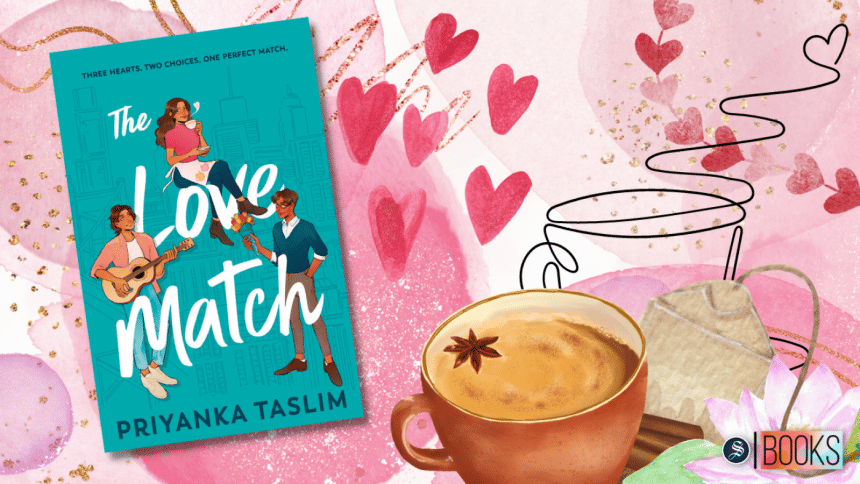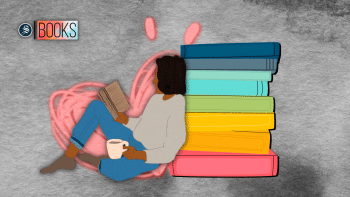A sip of sweet, comforting 'saa'

Take a pinch of Austenian romantic comedies of error. Add a spoonful of bangla natok. Pour in generous doses of social politics. What do you have? The Love Match by debut author Priyanka Taslim.
Based in Taslim's hometown of Paterson, New Jersey, The Love Match revolves around 18 year old Zahra who wants to study English at university and be a writer. Her mother questions the need to study a language she already knows and one where her career options would be limited as opposed to studying medicine, law, or engineering. Every Bangali parent's dream. Sounds familiar? Zahra's predicament can be summed up when she states, "Once upon a time, I had Amma to thank for my love of storytelling, but now she's become the reason I guard my hopes so deep inside my chest, where a callous comment can't blow them away like a stolen wish on dandelion fluff."
Zahra is accepted into Columbia University but due to financial constraints has resigned herself to attend her local community college. Working at a chai café to support her family financially after her father's death, she is introduced to Haroon by their respective parents, hoping to arrange a match. Zahra and Haroon strongly oppose the match, both believing they are too young to think of marriage before completing their education and working towards their chosen careers. They concoct a plan to thwart their parents' arrangement. Soon after, she meets Nayim, who has recently immigrated from Bangladesh and landed a job at her cafe. Sparks fly, and Zahra finds herself drawn to him due to their shared love for creative pursuits.
Keeping in mind the novel is written for a young adult audience with the expected tropes associated with the young adult romcom genre, each character arc has been allowed time to develop in full. Zahra is a strong but flawed protagonist. If at times she acts out as the confused teenager, she does show incredible maturity, especially in her interactions with her mother. Generational and cultural differences are portrayed with honesty and grace. There is no sugarcoating the Bangali mindset or strict adherence to tradition, however, there is also no disparagement of such issues.
Zahra's conversations with her mother brings out the nurturing, caring individual as well as the strong headed, bullish teenager who stands up for her beliefs. Zahra's innate sense of self is commendable, considering her identity as an American-born child of Bangladeshi immigrant parents residing in a middle-class neighbourhood in New Jersey. She speaks in her parents' native Sylheti dialect, enjoys deshi food and attire. She is resourceful and knows her mind. Throughout the novel, she acts as the responsible breadwinner for the family, a role that was singlehandedly performed by her deceased father.
Taslim portrays her characters as confident and comfortable in their Bangali-ness. There's a lack of inhibition in the usage of Sylheti phrases injected casually in everyday conversations. No direct translations are offered. Instead, they are skilfully explained through context.
Interestingly, there's a targeted wordplay with a South Asian twist. Haroon, a self-professed nerd, owns a pet bearded dragon, Rabeardranath Tagore. Zahra works in a chai café, Chai Ho—a tea oriented take on "Jai Ho", the Oscar winning OST from the movie Slumdog Millionaire— owned by the father of her Pakistani friends. And yes, the unspoken hostility due to a shared history between the older generations of Bangladeshis and Pakistanis is briefly touched upon. At one point in the narrative, Zahra realises she can have her roshmalai and eat it too. Zahra's, and possibly Taslim's, love for her Sylheti family background shows in her love for saa (cha).
Family lineage for prospective matches are also given considerable weight in the narrative. The Bangladeshi community of Paterson places a lot of importance on Zahra's once affluent familial zamindari legacy. Zahra jokes to herself that her family may be penniless, but they are practically Bangladeshi royalty. Haroon's family, on the other hand, are looked down upon as they are the nouveau riche with humble beginnings. So what if they have a thriving restaurant business and can send their son to an expensive private school?
There are references to casual racism, and sometimes more targeted microaggressions where Haroon explains how he and his cousin, two of the few students of colour in a fancy private school, adopted very different ways of dealing with their "otherness". This portrayal, I'd imagine, would be relatable to many second-generation children of immigrant parents.
A common trope among South Asian rom com writers is that of the gossiping Aunty network. The Love Match follows the same route via a Whatsapp group chat, where the Bangali Aunties pass judgements on everyone in the community. It manages to drive the narrative forward and is not simply used as a tool to pile on the humour and sarcasm—a clever technique that necessitates the inclusion of these additional characters.
A quick glance at Goodreads reviews shows that the novel faced a fair share of criticism from its target audience for aspects other than the plot or the writing. Although well-received by most, some readers failed to be impressed by its lack of "good Muslim representation" (possibly due to the manner of portrayal of certain romantic relationships) and the fact that the novel centred more on culture and less on religion.
The Love Match provides an honest and humorous glimpse into the Bangladeshi diaspora from the points of view of its younger generation, those in the throes of making decisions for themselves but held back by the sometimes unreasonable expectations of their immigrant parents. Expectations arise of being exemplary Bangali kids who'll carry forward the family legacy, one that was left behind upon immigration to America, and dwindled over the years into a mere memory of a once glorious existence.
Nabilah Khan was born and raised in Bangladesh and currently resides in Sydney, Australia. After more than a decade working in the global banking and financial services industry, she now works in the Australian public service.

 For all latest news, follow The Daily Star's Google News channel.
For all latest news, follow The Daily Star's Google News channel. 









Comments